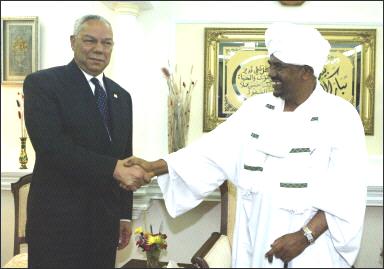Powell issues blunt warning to Sudan to take ‘action now’ on Darfur

KHARTOUM, June 29 (AFP) — US Secretary of State Colin Powell issued a blunt call to Sudanese leaders to take “action now” to end the humanitarian crisis in the western region of Darfur or face possibile UN sanctions.
Powell spelt out three main demands of Khartoum: rein in state-sponsored Arab militias accused of massive human rights abuses, open access to Darfur for humanitarian organizations, and start negotiations with the region’s two ethnic minority rebel movements.
“Unless we see more moves soon in all these areas, it may be necessary for the international community to begin considering other actions, to include Security Council action,” he told reporters after meeting Sudanese President Omar al-Beshir.
Powell, who arrived here armed with satellite photographs showing the deserted minority villages which Washington says were destroyed by the militias, said his talks had been “candid,” “straightforward” and “direct.”
Sudanese Foreign Minister Mustafa Ismail, who spoke at a joint news conference with Powell, acknowledged difficulties in the region but insisted they had been exaggerated.
“We admit there is a problem in Darfur,” Ismail said. “We believe that there is no famine, no epidemic, but that does not mean that there is no humanitarian problem which needs to be taken care of.”
He promised his government would unveil a new package of measures before the end of Powell’s visit, which on Wednesday takes him to Darfur, accompanied by senior Sudanese officials.
Powell said Beshir appeared to “understand” the severity of the situation but withheld judgement on any measures that Sudan might be contemplating.
More than 10,000 people have died in Darfur and more than a million been driven from their homes since the revolt against the Arab-dominated government in Khartoum broke out among the indigenous minorities in February 2003.
Hundreds of thousands of people are at risk from the deteriorating conditions and the militias, known as Janjawid, and the United Nations has labelled the situation the world’s worst current humanitarian crisis.
Powell told reporters en route from Istanbul that he intended to give his Sudanese interlocutors a “very direct message about how the United States and the international community sees the horrific situation in Darfur.”
“We have got to act now because we are running out of time,” said Powell, the highest-ranking US official to visit Khartoum since 1978.
Asked whether the violence being committed by the militias against the Darfur minorities amounted to “genocide”, Powell said a US review now underway had found “indicators and elements” that pointed to such a conclusion but.
“What we are seeing is a disaster, a catastrophe. We can find the right label for it later, we have got to deal with it now,” he said.
Powell also warned that the improvement in relations between Washington and Khartoum that followed peace agreements between the government and rebels in southern Sudan could be in danger because of the Darfur crisis.
“Unless we resolve the Darfur situation and do it quickly, all that is put at risk,” he said.
His visit coincided with Wednesday’s anniversary of the 1989 coup that brought Beshir’s Islamic regime to power, and his meetings took place against the backdrop of fireworks across the city.
Ahead of their talks, Beshir pledged new measures to smooth the flow of aid, but reiterated his position that it was the rebels, more than the militias, who were to blame for the continued deterioration of the crisis despite an April 8 ceasefire signed in neighboring Chad.
“It is a matter of record that the insurgent factions have in many occasions violated the ceasefire by attacking convoys of humanitarian relief and workers, destroying development projects under construction and killing the management staff and workers,” said Beshir.
“We shall redouble our administrative, technical and security efforts to secure relief access to the needy before the rainfall season.”
En route to Khartoum, UN chief Kofi Annan, who is to meet Powell here Wednesday, laid down the same demands and warned in Doha: “If that government is not able or willing to do it, the international community has to do something about it.”
Asked about Annan’s idea of a UN peacekeeping force, Powell said he thought the size and remoteness of Darfur and the lack of countries willing to contribute troops would make it “very problematic.”
“The better answer is to have the Sudanese government take control,” he said.
